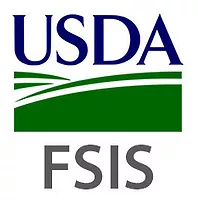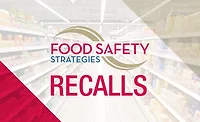FSIS highlights accomplishments in protecting public health

The U.S. Department of Agriculture’s (USDA) Food Safety and Inspection Service (FSIS) has announced key 2018 achievements in protecting public health by ensuring the safety of meat, poultry and processed egg products.
“In 2018, FSIS inspected more than 160 million head of livestock and 9.47 billion poultry carcasses, and conducted 6.9 million food safety and food defense tasks,” said Carmen Rottenberg, acting deputy under secretary for Food Safety. “Our dedicated FSIS workforce continues to ensure that consumers have access to the safest meat and poultry supply in the world.”
Targeting foodborne illness
FSIS has continued to target sampling and use other strategies to control Shiga-toxin producing E. coli, Listeria monocytogenes, Salmonella, and Campylobacter. FSIS is continuing to use whole genome sequencing to track illness, inform inspection and policy decisions, and enhance our collaborations with sister agencies and state governments.
FSIS continues to ensure that meat and poultry products are safe and wholesome for American consumers by improving food safety education and targeted communication efforts. In January 2018, FSIS began posting individual establishment Salmonella performance standard category information for carcasses, raw poultry parts and comminuted poultry products to incentivize the poultry industry to implement better controls for Salmonella.
Collaboration
Much of the agency’s work is conducted in cooperation with federal, state and municipal agencies, as well as private industry. In 2018, FSIS continued to strengthen its collaboration with Centers for Disease Control and Prevention (CDC) and the Food and Drug Administration (FDA) to meet the agency’s goal to improve coordination of federal food safety efforts and address cross-cutting priorities for food safety data. In addition, FSIS also maintained partnerships with 38 national, state and local organizations as part of a grassroots effort to spread the message about food safety.
Modernization
During 2018, FSIS continued its initiatives to modernize operations and inspection systems. In early January, FSIS proposed to amend the egg products inspection regulations by requiring official plants that process egg products to develop Hazard Analysis and Critical Control Points (HACCP) systems and Sanitation Standard Operating Procedures (Sanitation SOPs) and to meet other sanitation requirements consistent with the meat and poultry regulations. Under this proposal, plants will be required to produce egg products in such a way that the finished product is free of detectable pathogens. This modernization will lead to innovations in the egg products industry as well as align egg products regulations with the meat and poultry products regulations.
Looking for quick answers on food safety topics?
Try Ask FSM, our new smart AI search tool.
Ask FSM →
On January 19, 2018, FSIS also announced a proposed rule to modernize its swine slaughter inspection system, which is about five decades old. The proposed rule includes food safety and pathogen testing requirements for all swine slaughter establishments, in addition to an optional component, the New Swine Slaughter Inspection System (NSIS), which market hog establishments can choose to operate under voluntarily.
Additionally, FSIS proposed a number of deregulatory actions in 2018, including eliminating redundant regulations and taking a more science-based approach to regulatory controls. These proposed actions include removing unnecessarily prescriptive requirements for hog carcass cleaning, no longer requiring carcasses to be stamped with the USDA mark of inspection if the carcasses are to be also processed at the same facility, and no longer restricting the hours that an official establishment may prepare uninspected, inedible products, such as animal and pet food. Requiring establishments to follow these regulations no longer makes sense; meat and poultry establishments have been required to operate under Hazard Analysis and Critical Control Points (HACCP) since the late 1990s and are required to have controls in place to prevent hazards before, during, and after slaughter and processing operations.
In February 2018, FSIS published criteria that it will use to consider new waiver requests from young chicken establishments to operate at line speeds up to 175 bpm. The waivers will allow these establishments to test new equipment, technologies, or procedures that would allow them to innovate and operate at faster line speeds as long as they are able to maintain process control when operating at faster line speeds.
Siluriformes inspection
FSIS began fully implementing the Siluriformes inspection program in September 2017, and moved quickly to finalize foreign country equivalence determinations. FSIS worked extensively with foreign countries to ensure that only countries that had equivalent food safety systems were permitted to ship Siluriformes to the U.S. On Sept. 14, 2018, Vietnam, China and Thailand met the documentation and equivalence requirements to be able to ship Siluriformes to the United States.
Foreign country equivalence oversight and import reinspection programs
In 2018, FSIS completed ongoing equivalence verification audits of 18 countries to ensure compliance with applicable laws and regulations. In 2018, approximately 4.4 billion pounds of meat and poultry products were presented for FSIS re-inspection from the eligible countries that are actively exporting product to the United States. Currently more than 1,100 establishments and 39 countries are deemed eligible by FSIS.
Outreach
During 2018, FSIS saw major success in raising awareness of safe food handling guidance, recalls and information about foodborne illness. FSIS achieved more than 62 million impressions from media outreach, web page views, social media engagements, educational material distribution, app downloads and direct conversations with individuals on the hotline and in the field. This represented approximately 25 percent above the annual target for the year.
FSIS continued to provide outreach and technical resources to small and very small plants and launched an initiative to prioritize outreach to small and very small establishments through utilization of our Enforcement, Investigation and Analysis Officer (EIAO) field personnel. As part of this initiative, EIAOs dedicated more than 25,000 hours of time for direct outreach including one-on-one meetings with establishments, participation in roundtables, technical support, and onboarding of new establishments.
Emerging technologies
In recent years, scientists and industry have been developing products derived from the stem cells of animals, raising questions about regulatory jurisdiction, food safety controls and labeling of these meat and poultry products. FSIS proactively worked with its federal partners to determine the next steps, including hosting a joint public meeting (October 23-24, 2018) with the Food and Drug Administration (FDA) to discuss the use of cell culture technology to develop products derived from livestock and poultry. As a result, USDA and FDA are working jointly to oversee the production of cell-cultured food products derived from livestock and poultry in 2019. The regulatory framework will leverage USDA’s expertise in regulating, inspecting and labeling livestock and poultry products for human consumption.
Next steps
During 2019, FSIS will be working on Campylobacter standards, new Salmonella performance standards, finalizing rules proposed in 2018 and modernizing beef slaughter inspection.
FSIS currently employs more than 9,000 employees, of which over 8,000 work in federally regulated establishments, laboratories, import establishments or in-commerce facilities.








